or the road
Page 46

Page 47

If you've noticed an error in this article please click here to report it so we can fix it.
operators tell CM how have beaten the 'bumps' I the Middle East road
ONLY a brave man or a fool would claim that he could accurately state the road transit time between the UK and any point beyond Bulgaria. The contingencies the driver has to meet in Europe, west or east, can normally be catered for; but beyond the Bulgarian border things are vastly different. It is from here on that delays occur and the profit margin on jobs disappears.
Many of the delays can be traced to bad driver briefing and this in turn can be attributed to inadequate reconnaissance and pre-planning by the operator.
Mr Robert Carter, managing director of Trans UK Continental Ltd, has compiled one of the most detailed driver's manuals in use on the transEuropean Middle East run. He did not depend on secondhand information or the written advice issued by either the trade associations, consulates or the trade press, although he admits that all of this proved helpful in the initial stages.
Bob, the son of Leslie Carter, an East Anglian haulier, is experienced in all aspects of road haulage and holds an hgvl licence. Be also has inside knowledge of the operations of shipping and forwarding agencies. It therefore came easy to him to get behind the wheel of a 32-ton outfit and lead a five-vehicle convoy to Tehran. The result is a driver's manual which contains as much information es it is necessary and possible to carry, right down to pre-stamped and addressed airmail envelopes with ready-typed letters advising the Felixstowe office of Trans UK that each border has been crossed. This documentary evidence is shown to the customer; which be accepts, whereas there is just no proof to the customer that the driver has used the more conventional method of having "phoned the office."
The manual contains 22 transparent folder -t ype "pages," thus displaying 44 pages of material. It is arranged in the order in which the run will be made, with a mileage chart showing distances and routes between the points of entry to and exit from each country. There is detailed information on each country's traffic laws and border procedures and in addition to the originals of the permits the folder carries photostat copies.
As an example of the detail, in the Turkish section the drivers are advised that no matter how unreasonable the Turkish police might be there is no point in arguing with them "as t,hey, only delay the RF INTERPORT MOVEMENTS LTD was orginally a shipping and forwarding agent; today it is also haulage contractor, operating seven vehicles on Middle East traffic with a further eight in the pipeline. Mr R. Turner, the managing director, -told CM recently: "We find ourselves in the haulage business because we could not find a dependable haulage contractor for our Middle East operations."
However, we found Mr Turner's view of haulage contractors was derived mainly from what he felt to be the inability of the haulier to pro= vide suitably qualified, experienced and reliable drivers who had been well briefed for the jab before they set off.
Nine months after their first enquiry, RF Interport sent a three-vehicle convoy off to the Middle East. In the interim they had done a lot of detailed planning, and written information was obtained from the embassies of all the countries along the route, from the Department of the Environment and trade associations. Armed with this, Mr Turner and a fellow director made their own tape-recorded reconnaissance by private car all the way to Tehran. They returned armed with yet more information and detailed photographs of route signs and hazards. This they condensed into a series of route cards in a loose-leaf folder.
The company still appreciated, however, that the most important factor in the movement was the driver—not for getting his wife. They called a meeting of the men most likely to be put on •this run, together with their wives to sound out their personal feelings over a job that would mean separation for anything up to 30 days.
Having been chosen, the men for the job were given a week of intensive briefing so that they virtually knew every inch of the road before they set out. Even with careful selection of men—RFI chose from their existing staff and selected only two from 60 outside applicants —the company was still aware that some might succumb to the temptations and financial inducements that lay along the road. They drew up a driver's contract which each man has signed in the full knowledge that the penalties will be imposed if the contract is breached. Happily, to date, this has not been necessary.
Indeed the men at RFI have not only abided by the contract but are co-operating with the management in modifying the route cards in the light of their own experience with the ever-changing conditions to the Middle East.
The agreement is set out below.




































































































































